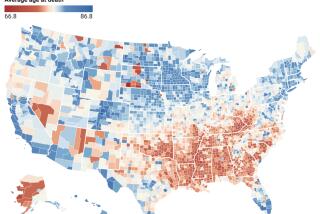Your kids aren’t killing you; one day they may actually help you live longer
- Share via
Sometimes — a lot of times — it feels as if being a parent is shaving years off your life, but a new study suggests that’s not the case.
In fact, just the opposite may be true.
In a paper published Monday in the Journal of Epidemiology and Community Health, a team of Swedish researchers report that having kids is associated with an increase in life expectancy, especially as we age.
According to the new work, 60-year-old women with children had a remaining life expectancy of 24.6 years, compared with 23.1 years for those who do not have children.
For men, the difference was even greater.
Sixty-year-old men with children were expected to live for another 20.2 years on average, whereas those without children were expected to live for an additional 18.4 years.
That’s nearly a two-year difference.
To come to these conclusions, the researchers used national registry data to track the life spans of more than 1.4 million Swedish men and women who were born between 1911 and 1925.
The researchers were also able to determine the marital status of the participants as well as how educated they were, and the number and sex of their children if they had any.
Previous studies had indicated that people who have daughters have a longer life expectancy than those who have just sons. To see if that was true, the researchers compared the life spans of participants with just one daughter to those who had just one son. According to their analysis, there was no difference in life expectancy between the two groups.
The authors also wondered if having an adult child who lives nearby would increase one’s life expectancy in older age. After crunching the numbers, they discovered this was not the case.
Indeed, it seems that parents 60 and older who live more than a 30-minute drive away from their children had a slightly smaller risk of dying within the year than those who lived closer to their children.
This finding may seem counter-intuitive, but the authors note that previous studies have shown that highly educated children are more likely to live farther away from their parents. They suggest that it is possible that having a well-educated child might have a greater effect on one’s chances of survival than proximity.
The results of this work are purely observational and cannot be used to draw any conclusions about why they see the effects reported in the study, the authors said.
They also said it is possible that adult children may offer various types of help to their aging parents. For example, physical, social, and emotional support all might increase a person’s life span.
The study may be particularly significant in places such as Sweden and other Nordic countries where childlessness is on the rise, the authors said. By understanding what it is that having a child offers an aging parent, it might be possible to provide similar services to those who chose not to have children.
Do you love science? I do! Follow me @DeborahNetburn and “like” Los Angeles Times Science & Health on Facebook.
MORE IN SCIENCE
Vegetarian Neanderthals? Extinct human relatives hid a mouthful of surprises
An outbreak in Brazil has U.S. health experts wondering if yellow fever could be the next Zika
Computers can now challenge — and beat — professional poker players at Texas hold ‘em







